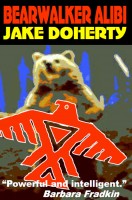So, who’s on first, or more literally what’s on first?
Not baseball silly
.just the first page of a novel, the author’s critical decision: Begin
with a gripping plot point? Or gently introduce
all the characters with a few warts and wrinkles.
Choices must be made but they can take time to sort out. I was at a literary conference in San Miquel de Allende in Mexico 2009 when the great American writer Barbara
Kingsolver was asked how she began her famously successful novels: door A or
door B?
“Neither” she allowed. As I recall, she told us she begins
with a simple idea of what her next book is about. “A person, a place, a crisis
of some sort - and write a first draft very rapidly in a few months. Then I
take a break”
In time, when she returns to writing: “I generally find that
my first page is somewhere in the middle of my first draft.”
I confuffled around too with Bearwalker Alibi - the
batting order or on the game? In the end, I listened to my muse, asking myself what
would I prefer as a reader. What’s the first question about a book called the Bearwalker Alibi. Most folks know what an “alibi” is but a
Bearwalker? Huh? Old myth or what, for
good or evil?
You decide. What follows is my choice, a very short Chapter
One:
Mid-winter, 1996
Fergus
Fitzgerald suddenly found himself stranded by a small frozen lake, near Sudbury in Northern Ontario.
Without
warning, his big Ford Escape had died silently, no herky-jerky death rattle
this time. He still had lots of gas and no warning lights were flashing on the
dashboard. This had been a short trip to visit a newspaper buddy, home-bound
and recovering from knee surgery.
Looking
around for help, he saw no traffic on either side of the road, just endless
rows of tall trees and rocky outcrops, and the overwhelming ache that he had
been here before, a flashback – a shaman would say a curse – that overrode
every other memory.
It
had started several years before with the sight of a ferociously large black
bear rearing up on its hind legs, and staring back at him with almost luminous
eyes. Fergus had been driving north to escape Toronto after his young wife had died of
cancer, and had stopped to ski along an isolated lake. The only sound came from
the whistling winds of a snow-squall out of the northwest that blurred his
vision.
There
was a brief moment, however, when he could make out the torn carcass of a deer about a hundred meters ahead, ribs
with bits of skin still attached, sticking out of the hard frozen ice, and
blood spattered over the cold white surface like an urban crime scene
As
the winds eased for a moment, Fergus’s perception seemed to shift, and he saw
the bear as almost human – certainly a different shape now with a smaller head
and an arm that point at its kill, and then raised an angry first at him. This
transformation startled Fergus, not knowing or accepting that really had
happened: was it a quick flurry of blowing snow like a looming northern mirage,
or perhaps was it something more primordial, left behind from an earlier time
in the ancient forest. The image, or images, took root in him as the bear
walked off the ice onto the green-grey granite shoreline and disappeared into
the woods.
Instinctively, Fergus sided with the deer,
angry at the bearwalker, but equally at himself for taking pleasure at the
savage beauty of the scene. But, he told himself, this is nature, this is the
natural order of life, so just ski away, and don’t look back.
That,
of course, was several years ago. Alone, again, Fergus gulped a quick belt of
scotch, savored its warmth from a flask, and turned the ignition key. The
engine quickly started.
With a last look at the lake, he drove away.
Strange, he thought, if those images were real then, where is the bearwalker
now?
**************************************************************
If you enjoyed Chapter One, why not read the whole book. Buy it now on Amazon






